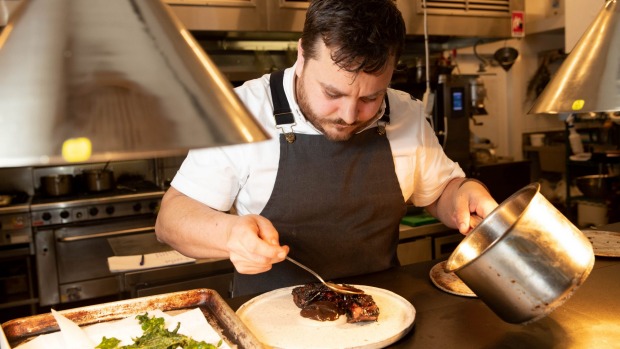Holiday-makers in regional NSW may find themselves ordering more takeaway this summer with restaurants cutting back opening hours and diner capacity due to severe staff shortage.
“Most restaurants down here are having to limit what they can offer because they can’t find enough staff,” says Michelle Bishop, president of the South Coast Tourism Industry Association and owner of Bangalay Luxury Villas and Dining at Shoalhaven Heads.
“It’s really frustrating because people are walking into restaurants without a booking and they will see that the dining room isn’t full, but they can’t understand why they can’t have a table. Unfortunately, a lot of venues just don’t have staff to meet demand.”

It’s a problem common to high-tourist areas across the country: holiday towns are becoming busier and busier, but Australia’s international border closure through COVID-19 has stopped the flow of overseas workers the hospitality industry has long relied on.
Meanwhile, see-sawing lockdowns in NSW and Victoria have caused Australian restaurant workers to seek employment in more pandemic-proof industries.
It means regional restaurants can’t make the most of a huge demand for their service (and recover a fair amount of the revenue lost to coronavirus restrictions) now that fully vaccinated NSW residents are allowed to travel for recreation throughout the state.

“Bookings are already amazing for summer, and we keep getting excited about the state government’s $5000 outdoor dining grant [to establish new al fresco settings],” says Jo Thomas, who runs the 26-seater Small Town Food + Wine in Milton on the South Coast with her husband Alex Delly.
“It would be great to have a few umbrellas and tables outside, but then we remember that we can’t actually serve any more people. We would love to open daily, but at the moment we only have enough people to staff the dining room four days a week.”
Hospitality job boards have been flooded with ads for kitchen and front-of-house positions since it was announced lockdown was lifting on October 11.
While Sydney restaurateurs are experiencing considerable difficulty finding employees too, regional hospitality businesses have a much smaller pool of potential staff than their city counterparts.
“There’s a false idea that anyone coming into work at a restaurant has to be shiny and polished from day one, but, to be honest, we just want anyone with two arms, two legs, a brain and a slight personality,” says Thomas. “We’ll teach you the rest.”
If a regional restaurant operator can attract a new staff member from outside their local area, they also need to ensure that employee has suitable accommodation.

“You’ve got to offer the whole package,” says Thomas. “But affordable rentals are getting harder and harder to find on the South Coast with more people from Sydney and Melbourne moving here or buying holiday homes they can put on Airbnb.
“We were just lucky to find accommodation for a new chef last year just by asking on Instagram, and now she’s living in the servants’ quarters of an old mansion just out of town.”
It’s a similar story in the Northern Rivers, where a Byron Bay barista may find the most affordable rent is a sharehouse in Casino, one-hours’ drive away.

“I spent a lot of my time through the pandemic securing local accommodation for people,” says Tristan Grier, co-owner of Harvest restaurant, bakery and delicatessen in the Byron hinterland.
A Northern Rivers resident for the past 20 years, the restaurateur was able to use his connections to find granny flats and spare rooms for chefs and floor staff relocating to the region.
After realising he didn’t have enough staff to meet demand after the first wave of COVID, Grier also went into debt during the most recent lockdown by making sure employees remained connected with Harvest. The restaurant provided an extra 15 hours work per person each week through odd jobs at farms, delivering food and building vegetable boxes.

“Any money we spent then, we knew we would get back ten-fold because we didn’t lose a single person, and now we can reopen with a full team seven days and five nights a week,” says Grier, who will be collaborating with Harvest’s new sustainability-focused chefs Jo Barrett and Matt Stone this summer, plus the group’s high-profile creative director David Moyle.
“We also use the word ‘partners’ at Harvest, not ‘staff’,” he says.
“A big part of solving the shortage problem – which was an issue before the pandemic too – is how to move people away from being a commodity in the hospitality industry, as they have been viewed for a very long time, to shaping a restaurant job into a career.
“That means providing people with pathways and asking them what they need to be happy and what they need for an education.”
Thomas agrees that better promotion of hospitality as a career choice for young Australians is the long-term key to solving the staff shortage problem in regional restaurants, rather than relying on working holiday and skilled visa holders.
“There’s often a gap when it comes to working with local high schools and TAFE in regional areas and we end up losing our kids to the city,” she says.
Indeed, at Muse Restaurant in the Hunter Valley, owner-chef Troy Rhoades-Brown has focused on training young locals for the past decade and kept all 26 of his fine-dining staff through the pandemic.
“I get a lot of year 11 students studying food technology to visit Muse so I can show them around the restaurant, cook a couple of dishes, and talk to them about how good hospitality can be as a profession,” he says.
“I talk to them about opportunities for travel and financial success within the industry, because those students also have to go home and justify why working in a restaurant is a career they want to pursue, when their parents might want to push them towards university.
“Being an approachable boss and not throwing hot pans at kitchen staff helps attract people too.”
Meanwhile, Michelle Griffin has also been focusing on providing full-time salary positions and career pathways at Bangalay Dining, in addition to lobbying the government for more affordable childcare for hospitality staff on evening shifts.
“We’ve got people ready and willing to work for us, but they can’t get anyone to look after their kids at an affordable rate after 5pm,” she says.
“An increase in financial assistance for hospitality workers who need to pay for after-hours childcare wouldn’t be a silver bullet, but it would help a lot.
“There are multiple barriers to getting people to work in regional hospitality, and multiple actions are needed to solve the staff shortage crisis.”











